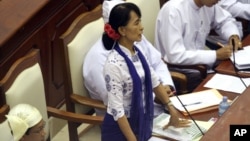Burmese opposition leader Aung San Suu Kyi’s appeal to parliament to address the poverty in ethnic minority communities is a “significant departure” from traditional calls for reform, says a noted Burma expert.
Sean Turnell, a professor of economics at Macquarie University in Australia, called Aung San Suu Kyi’s maiden speech to parliament Wednesday “a moment in history” and said using that moment to discuss ethnic minorities was particularly significant.
“If there is one unifying figure, it’s Aung San Suu Kyi. So in some ways, she’s the right person to talk about this particularly intractable problem,” he said.
Aung San Suu Kyi focused on the economic plight of Burma’s ethnic minorities. Quoting an Asian Development Bank report, she said these groups face the worst poverty in the country.
Many of the country’s ethnic minorities have fought the military for more autonomy in a decades-long conflict that has displaced tens of thousands of people. The civilian government that came to power last year reached ceasefire deals with several ethnic rebel groups, but fighting persists in Kachin state and Amnesty International says attacks and human rights abuses against Rohingyas and other Muslims in Rakhine state are increasing.
Turnell says Burma observers often talk about the importance of economic reform in the country, but they generally leave the ethnic minorities out of that equation.
“They are very often off the radar when we look at the big multilateral lenders, when we’re talking about firms going in to invest and so on," he said. "Very often the consideration for the differences and the terrible deprivation that is there for many ethnic minority areas is not just a political one. There’s also an economic dimension."
Many of Burma’s ethnic groups live along the Thai and Chinese borders, key trading areas rich in natural resources. Turnell says by using her parliamentary speech to tackle Burma’s ethnic situation, Aung San Suu Kyi is turning the domestic issue into a global economic one.
“It’s usually just extracting firms move in and ship out gas and oil and gems and teak and all the rest of it, so often leaving chaos and environmental destruction in its wake, for not much benefit. So, in a sense, by drawing attention to the economic problems, some of those issues get a bit of a highlight as well,” he said.
Aung San Suu Kyi long pushed for reform outside the government, advocating change through her National League for Democracy party. Now, after spending years under house arrest, she is joining the political process after being elected to parliament in a rare by-election last April.
Turnell said Aung San Suu Kyi’s presence in parliament makes Burma’s political reforms more legitimate, but the country is still far from being a democracy.
“So, it’s a bit of a gamble for someone like her. But it’s a gamble that I think she thinks is worth taking. It's just pushing the country in a progressive direction towards democracy, but it’s certainly not there yet,” he said.
Sean Turnell, a professor of economics at Macquarie University in Australia, called Aung San Suu Kyi’s maiden speech to parliament Wednesday “a moment in history” and said using that moment to discuss ethnic minorities was particularly significant.
“If there is one unifying figure, it’s Aung San Suu Kyi. So in some ways, she’s the right person to talk about this particularly intractable problem,” he said.
Aung San Suu Kyi focused on the economic plight of Burma’s ethnic minorities. Quoting an Asian Development Bank report, she said these groups face the worst poverty in the country.
Many of the country’s ethnic minorities have fought the military for more autonomy in a decades-long conflict that has displaced tens of thousands of people. The civilian government that came to power last year reached ceasefire deals with several ethnic rebel groups, but fighting persists in Kachin state and Amnesty International says attacks and human rights abuses against Rohingyas and other Muslims in Rakhine state are increasing.
Turnell says Burma observers often talk about the importance of economic reform in the country, but they generally leave the ethnic minorities out of that equation.
“They are very often off the radar when we look at the big multilateral lenders, when we’re talking about firms going in to invest and so on," he said. "Very often the consideration for the differences and the terrible deprivation that is there for many ethnic minority areas is not just a political one. There’s also an economic dimension."
Many of Burma’s ethnic groups live along the Thai and Chinese borders, key trading areas rich in natural resources. Turnell says by using her parliamentary speech to tackle Burma’s ethnic situation, Aung San Suu Kyi is turning the domestic issue into a global economic one.
“It’s usually just extracting firms move in and ship out gas and oil and gems and teak and all the rest of it, so often leaving chaos and environmental destruction in its wake, for not much benefit. So, in a sense, by drawing attention to the economic problems, some of those issues get a bit of a highlight as well,” he said.
Aung San Suu Kyi long pushed for reform outside the government, advocating change through her National League for Democracy party. Now, after spending years under house arrest, she is joining the political process after being elected to parliament in a rare by-election last April.
Turnell said Aung San Suu Kyi’s presence in parliament makes Burma’s political reforms more legitimate, but the country is still far from being a democracy.
“So, it’s a bit of a gamble for someone like her. But it’s a gamble that I think she thinks is worth taking. It's just pushing the country in a progressive direction towards democracy, but it’s certainly not there yet,” he said.
Loading timeline...










